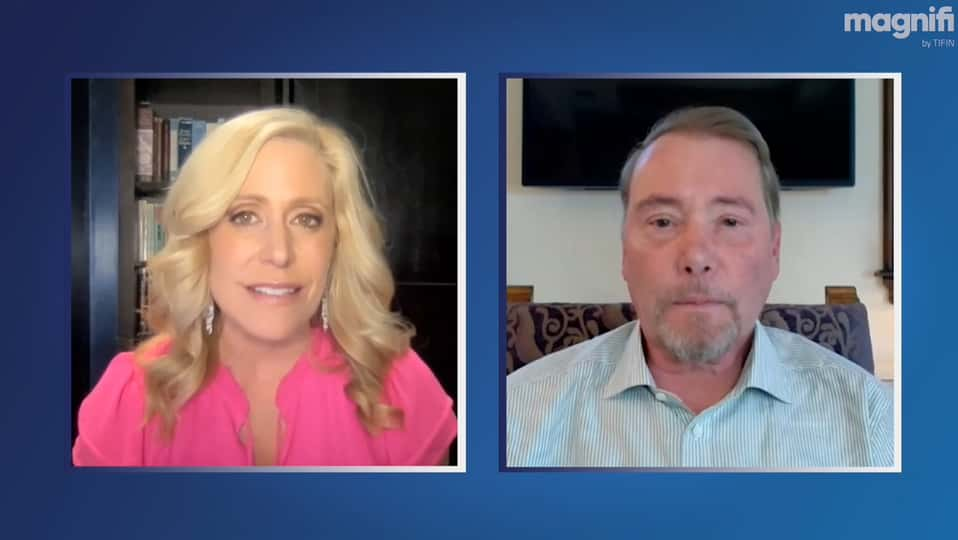Jeffrey Gundlach, Founder and Chief Executive Officer of DoubleLine, joins Melissa Francis to share his take on the Fed, Interest Rates, and Stagflation.
To watch the full interview with Jeffrey Gundlach, in addition to interviews with Anthony Scaramucci, Kyle Bass and Tim Seymour, check out Magnifi by TIFIN.
Melissa Francis: Welcome, everyone. Today we’re here to talk about Magnifi by TIFIN, a marketplace where you can harness real-time proprietary data to help individual investors and financial advisors find, compare and buy investment products like stocks and ETFs and mutual funds and model portfolios to grow and preserve your wealth.
I’m Melissa Francis. I know a little bit about this subject matter. I am former CNBC, MSNBC, Fox Business and Fox News anchor. And joining us today is investor, legend and founder of DoubleLine Jeffrey Gundlach. Welcome. Thank you so much for joining us. I know on a day when we are watching markets tank, everyone wants to talk to you and get your perspective. I’m lucky enough to have you here and I’m just going to let you go. What’s your take on what’s happening today?
Jeffrey Gundlach: Well, I think we need to start admitting that we’re running into a stagflation situation. The Fed is in a really difficult position because these price spikes are really going to need the Fed to be aggressive if they’re serious at all about fighting inflation. And we’re starting at such a low rate level relative to an inflation rate that’s already seven and a half percent. We have about a 1.7% 10-year treasury. We have Jimmy Carter type of negative interest rates. They’re even more negative than Jimmy Carter.
And then just to continue the metaphor, we obviously have skyrocketing crude oil prices. In the last six trading days, the price of West Texas Intermediate is up 35%. So when people are complaining about gasoline, they ain’t see nothing yet. There’s some stations here in Southern California where the premium gas is $7.60 a gallon. And that was at $5.20 at those same gas stations like six weeks ago and everybody was marveling how high they were.
Melissa Francis: Can I jump in right there and ask you about that? Because you I’m somebody who covered energy for 20-plus years and I’ve seen these fluctuations before based on what we would always call geopolitical jitters. Are you sure that this is going to last? I mean, obviously right now as we’re looking at this standoff between Russia and Ukraine, everyone’s panicking.
But if there is a resolution, why wouldn’t crude oil go back down? Not all the way. I understand that there’s a lot of demand out there and that we’ve been stupid in this administration and that we haven’t pumped as much oil as we should. But what makes you think it’s really going to stay at this level?
Watch the full interview with Jeffrey Gundlach HERE
Jeffrey Gundlach: I just kind of think the trend is your friend. We’ve been talking about temporary inflation in many, many items for 18 months now and there just isn’t any setbacks. You look at the Bloomberg Commodity Index, it’s up over 100% in 18 months and there’s almost no correction. So I just think we have supply problems relative to demand. And until the cycle breaks, I just think you got to go with the trend. And it seems to me that we’re going to be seeing just further pressure for this year.
I did a thing a year ago and I went back and listened to it and I was sort of shocked how quaint it was. I was talking with somebody about how inflation might go to 4% at the peak in the middle of 2020 and now it’s basically doubled that. And I just sort of think that we’re going to be constantly underestimating inflation because we have all of this stimulus that takes time to go through the system.
I mean, an intelligent 12-year-old could tell you that if you gave thousands and thousands of dollars to families in America while simultaneously curtailing the supply of goods that you’re going to get inflation. And the thing about the financial markets and the macro economy is you can connect dots and think you see a picture of where things are going to develop to, but it takes forever for it to happen. It takes so much longer. The gears spin so much more slowly than people’s patience wants them to, but inexorably they end up turning in that direction and that’s where we are.
And now the problem that we’re having is I think that the recessionary risk is going up very substantially when we look at sentiment, which is down very, very low in the most recent University of Michigan driven mostly by cars and autos as being up so much. But then you’ve got the yield curve, which is flattening and flattening. And I like to look at the starting point, the spread between the two-year treasury yield and the 10-year treasury yield. And once it gets inside of 25 basis points, you’re on a recession watch.
And there was a moment today we were at 15 basis points. And then so the other thing is that historically oil shocks have led to demand destruction that causes recessions and a number that is often referred to is if oil goes up by about 50%. Well, it’s done that very substantially in just a few months. So I think that we’re going to start hearing the word stagflation a lot more.
Watch the full interview with Jeffrey Gundlach HERE
Melissa Francis: I don’t mean to interrupt you, but we already heard stagflation earlier today. We had Kyle Bass on. He said pretty much the same thing, but he had a different remedy for it. So he was thinking that the Fed was going to be forced to back off. He felt we might go into recession by the third quarter and that mights stop the Fed from tightening. But it sounds like you’re saying, you’re calling for almost a Volcker type Fed move saying that we’re in a Carter period and the Fed’s going to have to get really aggressive. Did I misunderstand you?
Jeffrey Gundlach: I think I’m just channeling Jay Powell when I make comments like that. He said something like that in his most recent testimony. He’s sort of praising Volcker because he understands that this situation is going to be inflationary and they’re going to have to fight inflation. For the Fed to have any credibility, they have got to raise interest rates. If the inflation, it goes to 8%, 9%, 10%, which I think is not implausible. I think the Fed has to raise interest rates. I think this Ukrainian war situation actually makes the Fed have to be more aggressive because if they don’t, then the Fed just doesn’t have any purpose.
So the situation that they’re in right now is the most difficult that Jay Powell has seen or any Fed chair in a while because the stock market is basically in a bear market. The NASDAQ is right about that 20% number. The S&P is at the low of the year and yet the inflation rate is going up. And the economy is likely to slow down with all of these price increases curtailing demand. So their number one goal is stable prices at least that used to be the case.
And then we talked about employment. Well, employment looks reasonable, so that’s not going to stop them from raising interest rates. And then they’ve sort of secretly, stealthily in the last 15 years or so added that third mandate that’s not spoken up in public, which is when stock market goes down by X and X seems to be 20 or 30% we have a reaction. And the reaction is a pivot in Fed policy. But if we’re going to have a recession, my fear is that we are going to see another round of this tool of stimulus and money printing.
And we’ve been doing it now for quite some time. And every time we run into an economic problem, we do more of it. And the money printing that we did in the last two years to boost nominal GDP, the amount of debt that we took on just at the Federal level is more than the increase in nominal GDP since the Nader of economic activity in the aftermath of the lockdowns. So one can sort of say there is no economic growth. It’s just government spending and government money printing, which is really going to lead us into a new phase of, I think, problems the next go round of this stuff, where I think it’s going to be a negative dollar trend.
Watch the full interview with Jeffrey Gundlach HERE
Just think of what commodity prices are doing in other currencies than the dollar. The Dollar Index is up at a local high, it’s up at 99. A year ago, it was around 90. So it’s up 10%. And we have these oil prices in dollars are at these huge numbers. Just think of what the price pressure is for emerging market currencies that are weak or even the euro, which has been very weak versus the dollar. So this is a global phenomenon. When you look at global inflation surprise indices, they’re at levels never seen before.
Single region of the world has inflation data that is surprising to the upside. There isn’t one that’s surprising to the downside. So the Fed has to act on this. I respect Kyle Bass a lot, and I know there are a number of intelligent people and analysts that say the Fed’s going to back off, but I think the opposite is going to happen with this price spike needing some attention.
Melissa Francis: Okay, but it seems like one of the things that always gets in the way is politics. And obviously we have a midterm election. We’re not going to have a lot of politicians in Washington that want to see stagflation, this recession go on. Things get worse and worse economically. Don’t you think they’ll put pressure on the Fed to do something different? I know that’s not supposed to be the way it works, but those of us who live in the real world think that potentially the Fed is influenced by politics. I mean, how does that play out?
Jeffrey Gundlach: It’s possible. It might mean that they have to be more aggressive in the months ahead so that they can maybe not be so aggressive say late in the summer or early in the fall for the election. That could be the case. That’s another variable that suggests a fairly aggressive Fed. I know that 50 basis points seems like it’s off the table here in March 2022, but I think that 25 is just a guarantee. And I think there’s going to be at least four hikes before say late this summer.
So that’s what’s coming and it’s not enough. The inflation rate is so high compared to the interest rates that it’s going to take some real action. I think. And one thing also, Melissa, is the long end hasn’t had rates go up. In fact, long rates have been going down for the past year. I mean, they’ve had volatility to them, but they’re lower than they were. The 30-year treasury’s lower than where it was a year ago. So the Fed is being predicted by the bond market to completely flatten the curve.
One year from now, the forward pricing of the bond market is that the 30-year treasury yield will be where it is today with the short rate going up to about one and a half percent. So a flat yield curve at these yield levels sends a monstrous signal that the economy could be entering a period of fragility. With durable goods, obviously sales were pulled way forward with appliances and autos and housing and all these things. So there’s room for those things to slow down and that’s what we’re looking at.
Watch the full interview with Jeffrey Gundlach HERE
Melissa Francis: I guess one of the points that I was trying to get at is that it’s hard to imagine a Fed today that has the will of a Volcker. You mentioned the fact that whenever the stock market dips a certain amount that they go and get involved. It seems like we have been living in an era of a very protective Fed for decades now where they’re willing to act to, I don’t know sort of place a pillow wherever the economy may potentially fall.
The idea that they’re going to suddenly have the come to Jesus moment and really battle stagflation. While I agree with you that it’s necessary, it’s hard for me to imagine them really having the will to do that. I mean, would you bet your money that they’re going to get in there and really swing?
Jeffrey Gundlach: I think I’m already doing that. I mean, I have a very low risk position and I have had for a while now because I think everything was balanced on zero interest rates and on top of that, quantitative easing that was running at $120 billion a month. And we’ve seen this movie before where the two-year treasury yields goes on a little bit of a strike. And you see the Fed at zero, but the two-year treasury yield started to rise about a year ago. And the Fed just follows a two-year treasury.
I say somewhat facetiously, but not fully facetiously that we could replace the 800 PhD economists at the Fed with a two-year treasury yield on a Bloomberg screen because they just follow the two-year treasury. And so the two-year treasury went up and so all of a sudden Powell had to go into a pivot. And so that’s what happened. It’s going to be dependent upon how the two-year treasury behaves. And it’s possible that the bond market’s message, I think it’s even likely, is accurate. And they’re going to be raising interest rates until a recession comes.
And the message is that the recession is going to come at pretty low interest rate levels, which will lead to another bailout, if you will, of the economy, but the only tool that they know, which is always higher deficit spending. So I really don’t like dollar-based investments at this point because the dollar is so high and it’s likely to stay high. As long as the yield curve flattens, it’s very highly correlated to a higher dollar. And the yield curve’s been flattening, the dollar’s been going up.
But when the next recession comes, I think the response is, like you say, a pillow. That’s a very gentle, nice way to say there’s a pillow under the market. I kind of say that the authorities are drug pushers and they’re putting heroin into the economy all the time. And the doses keep getting bigger and bigger. Maybe the next dose is going to be heroin laced with fentanyl. And it’s possible that the dollar just can’t stand it anymore and starts to decline. That’s how I’m positioning.
Watch the full interview with Jeffrey Gundlach HERE
Melissa Francis: Let me turn you to what is potentially or what was the cause of a lot of this in the first place. Everything that’s going on in Russia in Ukraine or at least was the near-term cause of why we’re talking about all this. Do you have confidence in the Biden administration to deal with this properly or get us out of this situation, and keep in mind America’s best interest?
Jeffrey Gundlach: They haven’t done a good job so far. I mean, the report card on foreign affairs for the first year and a little bit of the Biden administration’s pretty low. I mean, the Afghanistan thing, announcing in December that there’d be no US troops going into Ukraine is the reason why Russia invaded, I think. I mean, we basically said twice in December and in January that we’ll support them, but we’re not going to send in troops. And we should have supported them during the first quarter, the first couple of months of this year with tremendous supplies of stinger missiles and javelins and things. And we didn’t do much of that.
So I haven’t seen an awful lot of strength out of the Biden administration. And in fact, there’s just a lot of flip-flopping on a lot of issues. And I worry like everybody else that Taiwan may be in the balance here too. It depends how well or badly Russia does in Ukraine. I mean, they’re doing badly enough that’s one of the good news items of the last couple of weeks is that the Russians are doing badly enough that maybe China is thinking twice about how easy it is to do these things.
But I don’t really believe that this thing is headed in a good direction. I think Russia is going to take over Ukraine. I think it’s inevitable unless we do the no fly zone, which we’re loathed to do for very, very good reasons. I think that’s the only thing that would stop Russia from succeeding ultimately in the takeover of Ukraine. And so, no, I don’t think the Biden administration is strong enough to meet the moment.
Melissa Francis: Yeah. And in terms of meeting the moment, I mean, it looks like the Biden administration is going to have a recession on its hands as well. Almost everybody we spoke to today has agreed upon that. How do you think they handle and respond to that?
Watch the full interview with Jeffrey Gundlach HERE
Jeffrey Gundlach: It’ll be a huge stimulus package, same old thing. And it always has to be bigger. Back in the global financial crisis, there’s a couple of trillion, this times six trillion. Next time it’s going to be so big and it’s going to cause a really big dislocation because it causes inflation. And yet when your only tool is a hammer, every problem looks like a nail. And that’s become our M.O. back really in the response to the global financial crisis and even before then was this ridiculous deficit spending and it’s out of control.
I keep telling people we have $165 trillion of unfunded liabilities in the United States. Those don’t go out hundreds of years into the future. They go out a couple of generations. We have a $24 trillion nominal GDP economy. So the unfunded liabilities are nearly seven times the annual size of the entire output of the GDP. So if we were actually going to try to fund these liabilities in a responsible way, it would take us 70 years nearly of putting aside 10% of our productive economy to fund these liabilities, which would mean that we’d be in a recession/depression for two or three generations. We don’t don’t have that tolerance.
And so we’re going to have to deal with these liabilities. And there’s only two ways to deal with them. One is to restructure them, which I think will be part of the solution. And the other is to devalue them. That’s it. You can’t pay back $165 trillion liabilities with a $24 trillion economy. It can’t be done. So if something’s impossible, it means it can’t happen and that’s how I view this situation.
Melissa Francis: You’re the bond king so how do you position yourself in bonds to … I mean, I don’t want to say take advantage of all that because it’s a bleak outlook, but to protect yourself through all of this.
Jeffrey Gundlach: Well, there is a case for… CLICK HERE to watch the rest of this interview at Magnifi by TIFIN
Want More Great Investing Ideas?
SPY shares were trading at $417.02 per share on Monday afternoon, down $3.05 (-0.73%). Year-to-date, SPY has declined -12.20%, versus a % rise in the benchmark S&P 500 index during the same period.
About the Author: StockNews Staff

The StockNews Staff is led by a team of investment experts including CEO, Steve Reitmeister and trading legend Adam Mesh. The goal of our commentary is to provide you with valuable insights to make more successful investment decisions. More...
More Resources for the Stocks in this Article
| Ticker | POWR Rating | Industry Rank | Rank in Industry |
| SPY | Get Rating | Get Rating | Get Rating |





